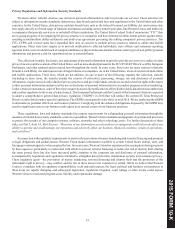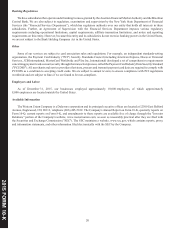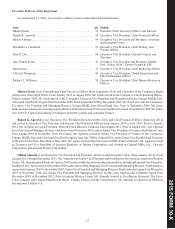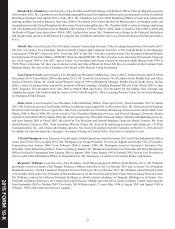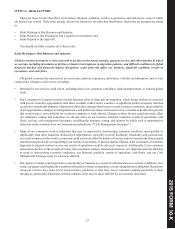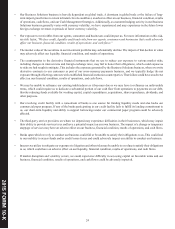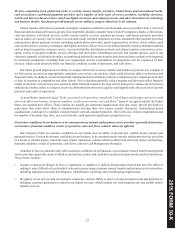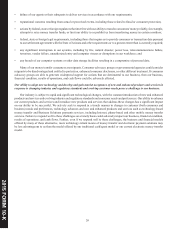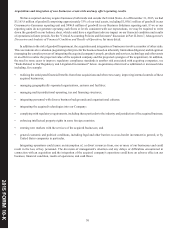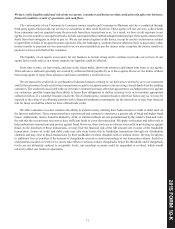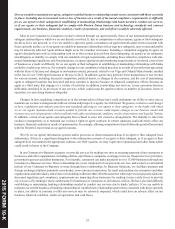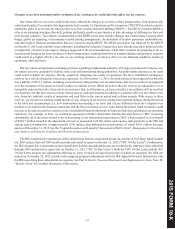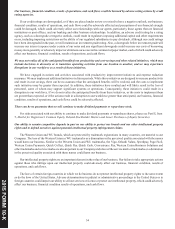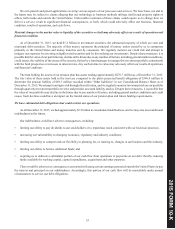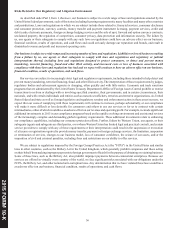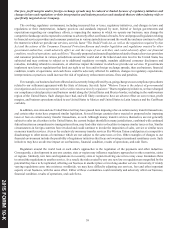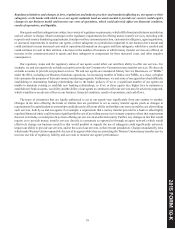Western Union 2015 Annual Report Download - page 131
Download and view the complete annual report
Please find page 131 of the 2015 Western Union annual report below. You can navigate through the pages in the report by either clicking on the pages listed below, or by using the keyword search tool below to find specific information within the annual report.
29
Breaches of our information security policies or safeguards could adversely affect our ability to operate and could damage
our reputation and adversely affect our business, financial condition, results of operations, and cash flows.
We collect, transfer and retain consumer, business, employee and agent data as part of our business. These activities are
subject to laws and regulations in the United States and other jurisdictions, see risk factor "Current and proposed regulation
addressing consumer privacy and data use and security could increase our costs of operations, which could adversely affect
our operations, results of operations and financial condition" below. The requirements imposed by these laws and regulations,
which often differ materially among the many jurisdictions, are designed to protect the privacy of personal information and
prevent that information from being inappropriately used or disclosed. We have developed and maintain technical and operational
safeguards designed to comply with applicable legal requirements. However, despite those safeguards, it is possible that hackers,
employees acting contrary to our policies or others could improperly access our systems or the systems of our business partners
and service providers and improperly obtain or disclose data about our consumers, business customers, agents, subagents, and/
or employees. Further, because a significant and increasing amount of our data is collected and stored by third parties, including
providers of cloud-based software services, it is possible that a third party could intentionally or inadvertently disclose personal
data in violation of law. Also, in some jurisdictions we transfer data related to our employees, business customers, consumers,
subagents, agents and potential employees to third-party vendors in order to perform due diligence and for other reasons. It is
possible that a vendor could intentionally or inadvertently disclose such data. Additionally, transactions undertaken through our
mobile services may create different risks of fraud, hacking, and other deceptive practices. Any data breach resulting in a
compromise of consumer, business, employee or agent data could require us to notify impacted individuals, and in some cases
regulators, of a possible or actual breach, expose us to regulatory enforcement action, including fines, limit our ability to provide
services, subject us to litigation, damage our reputation, and could adversely affect our business, financial condition, results of
operations, and cash flows.
Interruptions in our systems, including as a result of cyber attacks, or disruptions in our workforce may have a significant
effect on our business.
Our ability to provide reliable service largely depends on the efficient and uninterrupted operation of our computer
information systems and those of our service providers. Any significant interruptions could harm our business and reputation
and result in a loss of business. These systems and operations could be exposed to damage or interruption from fire, natural
disaster, power loss, telecommunications failure, terrorism, vendor failure, unauthorized entry and computer viruses or other
causes, many of which may be beyond our control or that of our service providers. Further, we have been and continue to be
the subject of cyber attacks, including distributed denial of service attacks. These attacks are primarily aimed at interrupting our
business, exposing us to financial losses, or exploiting information security vulnerabilities. Historically, none of these attacks
or breaches has individually or in the aggregate resulted in any material liability to us or any material damage to our reputation,
and disruptions related to cybersecurity have not caused any material disruption to the Company's business, although there can
be no assurance that a material breach will not occur in the future. Although we have taken steps and made investments to prevent
systems disruptions, our measures may not be successful and we may experience system disruptions or other problems in the
future. We also may experience software defects, development delays, installation difficulties and other systems problems, which
would harm our business and reputation and expose us to potential liability which may not be fully covered by our business
interruption insurance. Our data applications may not be sufficient to address technological advances, regulatory requirements,
changing market conditions or other developments. In addition, any work stoppages or other labor actions by employees, the
significant majority of which are located outside the United States, could adversely affect our business.
We receive services from third-party vendors that would be difficult to replace if those vendors ceased providing such services
adequately or at all. Cessation of or defects in various services provided to us by third-party vendors could cause temporary
disruption to our business.
Some services relating to our business, such as software application support, the development, hosting and maintenance of
our operating systems, check clearing, and processing of returned checks are outsourced to third-party vendors, which would
be difficult to replace quickly. If our third-party vendors were unwilling or unable to provide us with these services in the future,
our business and operations could be adversely affected.
201 FORM 10 K
5 -


